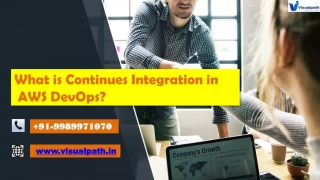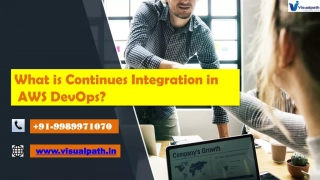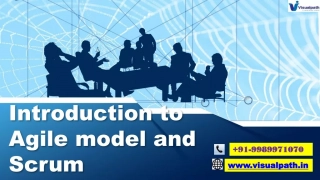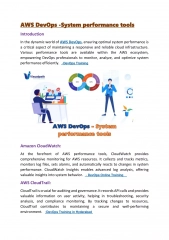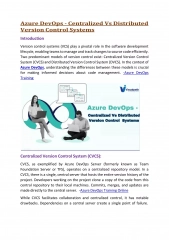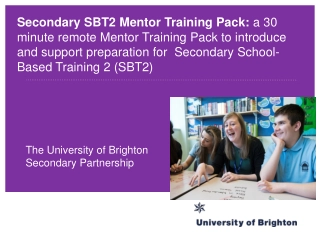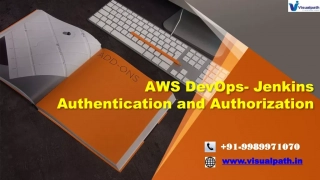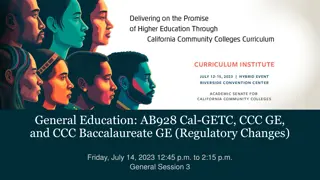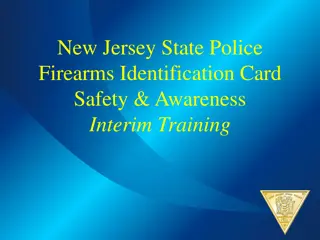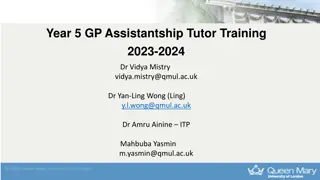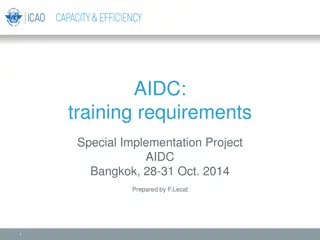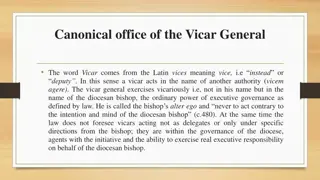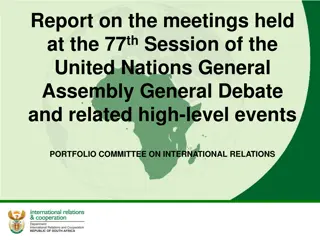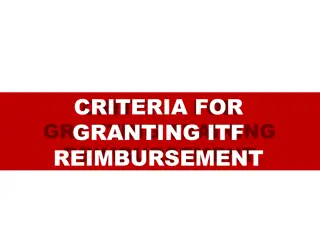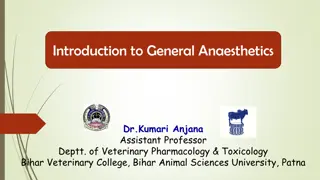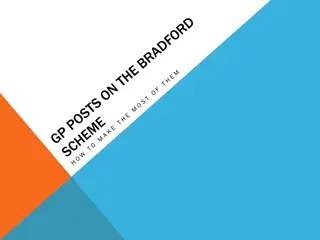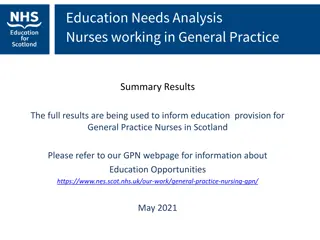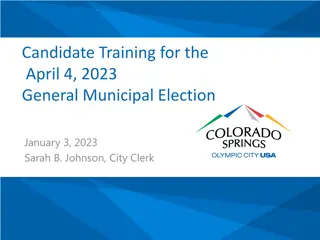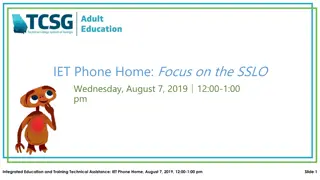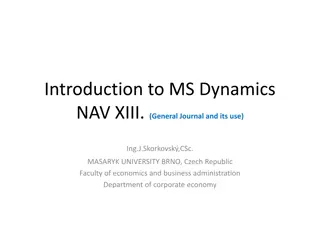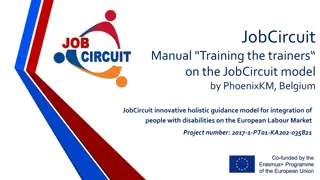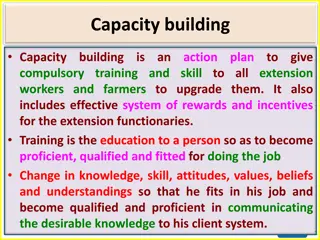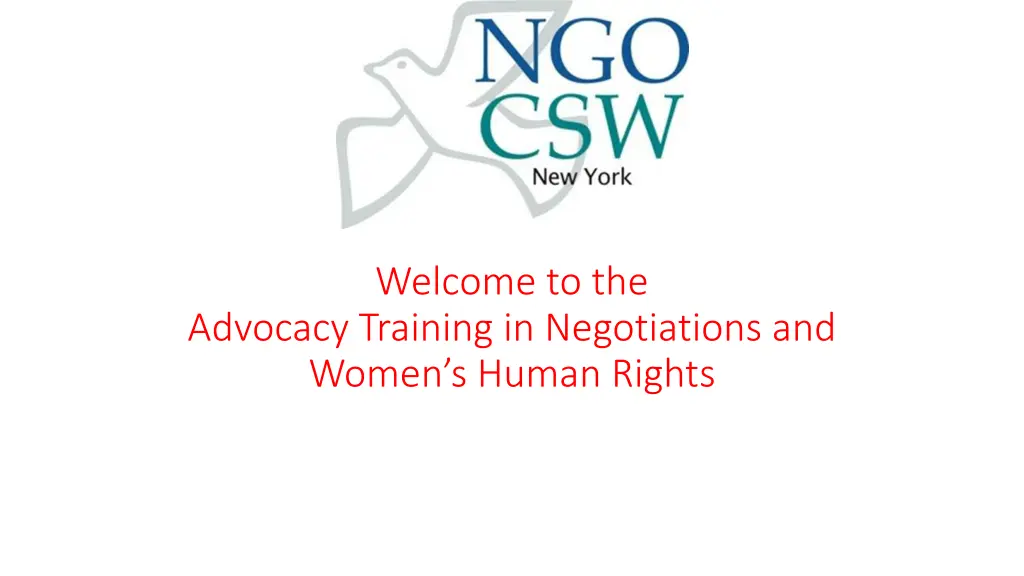
Advocacy Training in Negotiations and Women's Human Rights Overview
Enhance your advocacy skills in negotiations and women's human rights through this comprehensive training program. Download the training guidebook and explore various topics, including international policies, sustainable development goals, and key agreements. Discover how NGOs can influence the intergovernmental process and engage with social media for advocacy purposes. Stay informed about important global processes affecting women's human rights and gender equality outcomes from 2014 to 2017. Embrace the transformative agenda of the 2030 Sustainable Development Goals to achieve gender equality and empower all women and girls.
Download Presentation

Please find below an Image/Link to download the presentation.
The content on the website is provided AS IS for your information and personal use only. It may not be sold, licensed, or shared on other websites without obtaining consent from the author. If you encounter any issues during the download, it is possible that the publisher has removed the file from their server.
You are allowed to download the files provided on this website for personal or commercial use, subject to the condition that they are used lawfully. All files are the property of their respective owners.
The content on the website is provided AS IS for your information and personal use only. It may not be sold, licensed, or shared on other websites without obtaining consent from the author.
E N D
Presentation Transcript
Welcome to the Advocacy Training in Negotiations and Women s Human Rights
The Guidebook The Training Guide can be downloaded from the NGO CSW Forum Website in Arabic, English and Spanish (Russian & French coming soon) https://www.ngocsw.org/archive/n ews-you-can-use/advocacy-training- negotiations-womens-human-rights
Objectives & Format Within a safe, respectful and inclusive space: Familiarize with CSW & CSW61 Overview regional context Learn/refresh on advocacy tools for advocacy by women s human rights advocates Examples and Questions are welcome With a human rights based approach
Getting to know you Language spoken/preference Number of times at the CSW How many SDGs you can name At what level you work Why you are here
A Walk through the Handbook 1. Introduction 2. The Commission on the Status of Women and the United Nations 3. International Policies and UN Women s Conferences 4. The Sustainable Development Goals: A Transformative Agenda for Gender Equality 5. Women s Human Rights at the UN 6. A Quiz on Women s Human Rights and the SDGs 7. Key International Agreements 8. Language Equals Power 9. The CSW: A Case Study 10. The Intergovernmental Process 11. How NGOs Can Influence the Process 12. Advocacy Toolkit 13. Engaging with Social media 14. Appendices
Spaces & Processes that NGOs can influence Chapters 2, 3, 4, 7, 11
Whats happened 2014-2017? Multiple spaces and processes impacting women s human rights and gender equality outcomes SDGs High Level Political Forum (HLPF) Climate Change Financing for Development Disaster Risk Reduction Sustainable Development Knowing what they are will help prioritize where to invest time, financial and human resources Population & Development Beijing +2 Cities/ HABITAT III Gender Equality & Women s Rights
Transforming our world: the 2030 Agenda for Sustainable Development Goal 5. Achieve gender equality and empower all women and girls Goal 8. Promote sustained, inclusive and sustainable economic growth, full and productive employment and decent work for all
Issues / Challenges of Today Patriarchy and norms Sexual division of labor Macroeconomics/trade Environment, natural resources & climate change Decent work Sexual and reproductive health and rights (SRHR) Sexual orientation and gender identity (SOGI) Land and tenure rights Means of Implementation Financing for development Capacity building Partnership Accountability
Your Turn Other spaces? Where are you working? Global processes Regional processes Other spaces that intersect with these processes Why do you prioritize that space? High level of influence Participatory mechanisms Women s rights at risk How do you use the space? Advocacy Critical discussions and networking Transfomative space What are the issues?
CSW61 as a Case Study Chapters 9 & 10
CSW61 Session Overview 13-24 March 2017 Priority theme: Women s economic empowerment in the changing world of work Review theme: Challenges and achievements in the implementation of the Millennium Development Goals for women and girls (agreed conclusions of the fifty-eighth session) Emerging issue/Focus area: The empowerment of indigenous women Resolutions Outcome documents
Inputs prior to CSW Expert Group Meeting (September 2016) National Level Preparation (from CSW) Regional Preparatory Meetings (varies) Secretary General s Report (December 2016) Multi-stakeholder Forum (January 2017)
Official program at CSW General Discussion Ministerial Segment Round tables on Priority Theme Interactive dialogue Interactive Dialogues & Expert Panels Agreed Conclusions Informal Consultations
Unofficial program Informal consultations among governments Bilateral meetings between governments Side-Events hosted by governments (Access issues) NGO Forum and Parallel Events
Modalities of NGO participation Source: http://www.unwomen.org/- /media/headquarters/images/sections/csw/ngo/modalities-of- ngo-participation-flowchart2012.gif?vs=904
NGOs Participation Interactive panels On 14 March 2017, CSW will hold a high-level interactive dialogue among Ministers on Building alliances to promote women s economic empowerment in the changing world of work Written statements Oral statements Parallel Events & Side Events Advocacy broadly
How a Text is Negotiated The Zero Draft (Initial Draft Outcome Text) Written by the Chair s team and UN Women based on the collected data Sent to the Member States around 5 6 weeks prior to the CSW session Most of the paragraphs are quoted or agreed text (with references) Amendments: written proposals to change the text States can propose during a designated two-week time period: Add language, delete language Change means: adding the proposed language and deleting the existing language Multiple Rounds of readings Reservations
Sections from Agreed Conclusions 13. The Commission urges governments, the relevant entities of the United Nations system, international and regional organizations, women s and other civil society organizations, and the private sector, to take the following actions at the national, regional, and global levels: Strengthening normative and legal frameworks for full employment and decent work for all women Implementing economic and social policies for women s economic empowerment Addressing the growing informality of work and mobility of women workers Managing technological and digital change for women s economic empowerment Strengthening women s collective voice, leadership and decision-making Strengthening private sector role in women s economic empowerment
Issues and Clusters of CSW61 Negotiations Human Rights Rural Women Multiple forms of discrimination Civil Society Poverty Fiscal and tax policies Trafficking Health (including SRHR) Unpaid care Right to work and rights at work Women & Disabilities Violence & Sexual Harassment Informal Work National policy space Education Migration Work/ Family balance Macroeconomic policy Climate change & a just transition
Tips to engage with CSW Long term preparation Gather information Reach out to other NGOs Intervene at key moments Elaboration of the zero draft Written proposals to amend the zero draft During the negotiations After the adoption of the text Reach out to join your country delegation
Regional Focus: Instruments, Priorities, Positions, & Discussion
ADVOCACY Adapted from Advocacy Training for Rio+20 Conference, June 2012, & Advocacy Training for the UNFCCC, 2014, by the Women s Environment and Development Organization
Advocacy SKILL: Mapping Map the current situation Political climate and context Non-State actors in the space Leaders of the Process Map the delegates Delegates in your region Ally delegations you may be able to approach Delegations to watch Shared issues/priorities Observe what different delegations are saying within a group or as individual countries
Mapping Your Issues & Allies Role of Civil Society 12.The Commission, in order to transform the world of work for women [EU ADD: and eliminate the structural barriers to equal economic opportunities and outcomes], in women s economic empowerment [Argentina, Brazil, Colombia, Costa Rica, Dominican Republic, El Salvador, Guatemala, Mexico, Panama and Paraguay ADD: and recognize the role of civil society, including feminist groups]. (Based on E/CN.6/2017/3, para 47, and headers in para 49) [Russian Federation DELETE paragraph]
Mapping Your Issues & Allies Human rights defenders (bb.5) [EU ADD: Support and recognise the contributions of women s and community-based organizations, feminist groups, women human rights defenders and girls and youth-led organizations, in placing the human rights of women and girls on local, national, regional and international agendas;]
Mapping Your Issues & Allies Refugees (t) development by ensuring safe, orderly and regular migration policies that [US, Holy See DELETE: uphold] [US ADD: respect] [Holy See, EU DELETE: women s] [Holy See ADD: that fully protect the] [EU DELETE: human rights] [EU ADD: the human rights of women and girls] [Holy See ADD: of all refugees and migrants, regardless of status, ] in the context of implementation of the New York Declaration for Refugees and Migrants (General Assembly resolution 71/1) [Switzerland ADD: and in the Global Compact on Migration]; (E/CN.6/2017/3, para 49 (v)) [Russian Federation DELETE paragraph] Strengthen synergies between international migration and
Mapping Your Issues & Allies Indigenous women 10.8 [Argentina, Brazil, Colombia, Costa Rica, Dominican Republic, El Salvador, Guatemala, Mexico, Panama and Paraguay ADD: The Commission recognizes the critical role and contribution of indigenous women and their traditional knowledge, in enhancing agricultural and rural development, improving food security and eradicating rural poverty, proving an important participation to the economic growth.]
Mapping Your Issues & Allies Sustainable Development Goals 6.2 [African Group ADD: The Commission affirms that Women s economic empowerment and the realization of women s rights to and at work are essential for the achievement of the Beijing Declaration and Platform for Action and the 2030 Agenda for Sustainable Development and of particular relevance are Sustainable Development Goal 5 to achieve gender equality and empower all women and girls and Goal 8 to promote sustained, inclusive and sustainable economic growth, full and productive employment and decent work for all, but also Goal 1 on ending poverty, Goal 2 on food security, Goal 3 on ensuring health, Goal 4 on quality education and Goal 10 on reducing inequalities. (Based on E/CN.6/2017/3, para 2)]
Advocacy SKILL: Language Savvy Understand that Language is not just semantics Language is political power Sticky words - meaning Tricky verbs - strength
The power of language is multi-faceted MEANING Similar words can mean VERY different things Context is crucial Commas make a difference Verbs have varied strength POLICY IMPLICATIONS & NORM SETTING Defines what countries will implement and legislate Influences how policies are implemented Can be interpreted Later becomes agreed language WHO SAYS IT? And WHY?
TERMS to WATCH Sexual and reproductive health and rights Gender balance / Gender parity Equality / Substantive equality Equity Work / Decent work / Care work Gender responsive Family / Families Household Climate justice / Climate action Corporate social responsibility / Corporate accountability Your experience Who uses the terms? Are they UN? Other terms? Regional differences? National differences? What about translation to other languages?
VERB CHOICE Agreed Conclusions for CSW60 4. The Commission reaffirms that the Beijing Platform for Action, together with the outcomes of all major United Nations conferences and summits, laid a solid foundation for sustainable development and helped to shape the new Agenda for Sustainable Development (A/RES/70/1, para 11) that will leave no one behind. 4. The Commission [Russian Federation DELETE: reaffirms] [Russian Federation ADD: underlines] [CARICOM DELETE: that [Argentina, Turkey ADD: full implementation of] the Beijing Platform for Action, [EU DELETE: together with]] [EU ADD: and] the outcomes of [Holy See DELETE: all] [Iran, African Group, Russian Federation, Holy See ADD: relevant] major United Nations conferences and summits
Modifying Language & Verb Choice Agreed Conclusions for CSW61 (m) [Singapore ADD: nationally appropriate] social protection [EU ADD: systems, including] floors, [Arab Group DELETE: in line with [CARICOM ADD: and as applicable] [EU DELETE: ILO Social Protection Floors recommendation, 2012 (No. 202),]] [EU DELETE: as part of national social protection systems] [EU ADD: international social security obligations] [Singapore DELETE: [EU DELETE: to] [EU ADD: and] ensure access to social protection for all, including workers [US DELETE: outside] [US ADD: that transition from the informal sector to] the formal economy [EU ADD: and tackling in-work poverty] [CARICOM DELETE: , and progressively achieve higher levels of protection [Arab Group DELETE: in line with ILO social security standards]]]; (Based on E/CN.6/2017/3, para 49 (o)) [Russian Federation DELETE paragraph] [US DELETE: Establish] [US ADD: Consider establishing appropriate] universal
Modifying Language Agreed Conclusions for CSW61 (z) promote] the rights to freedom of association and collective bargaining to enable women workers, including informal and migrant workers, to organize and join unions [Mexico ADD: , cooperatives and business associations] and participate [Norway ADD: negotiations and] in economic [Canada ADD: and political] decision-making and design of policies for the world of work [African Group ADD: in accordance with national laws]; (E/CN.6/2017/3, para 49 (aa)) [Arab Group, Russian Federation DELETE paragraph] [Singapore ADD: As nationally appropriate,] Protect [Norway ADD: and
Advocacy SKILL: Agreed Language What is agreed language? A text that has been agreed on at the multilateral level (e.g. previous agreed conclusions from the CSW, ICPD, UNFCCC, Human Rights Council Resolutions, etc.) Agreed text is considered as a base for the future New language is challenging TOOLS = Apps
Agreed & New Language Agreed Conclusions for CSW61 (i.4) [African Group ADD: Regulate the extractive industry to address the impact that climate change and land degradation has on the economy and women s economic empowerment and rights; (New Language)] (i.5) [African Group ADD: Take steps to ensure that women s and girls unpaid work and contributions to on-farm and off-farm production are recognized, and promote shared responsibility within the household with a view to reducing and equitably distributing the burden of such unpaid work; (A/RES/70/132 para 2(s))]
Womens Human Rights app All texts about Women s Human Rights: General Assembly resolutions Security Council resolutions (1325 and later) Human Rights Council resolutions CSW agreed conclusions
Peacewomens app Principally texts about Women and Peace: Security Council resolutions (1325 and later) Links to national and regional action plans
Gender Climate Tracker App https://genderclimatetracker.org
Advocacy SKILL: Deliver key messages Create KEY messages Concrete and persuasive around your goal Overall declaration or statement Supported by facts/rationale Include call for action / recommendation TOOLS to support advocating key messages Issues Brief (internal) Factsheet (external) Elevator speech (external) Specific language recommendations (after the text is drafted)
Advocacy SKILL: Direct Text Recommendations HOW to EDIT (bold and underline for additions) 9 y) ensure that the network of follow-up and review processes of the 2030 Agenda for Sustainable Development overseen at the global level by the High-level Political Forum systematically integrate a gender perspective and include the participation of women s, and feminist organizations. (based on (E/CN.6/2016/3, para 49 (w)) [Russian Federation DELETE para]
Your turn working with the tools! Your elevator speech Your issues brief Your key contacts Your key allies
ADVOCACY on the ground! Use your factsheet (and coffee/chocolate!) Set up meetings with members of delegations & UN agencies Attend parallel events and side events or host an event Use your allies (e.g. NGO colleagues on delegations) to access the information in real time Follow what the delegates say and what text they submit in the negotiating rounds Talk to your colleagues / government contacts in capital when you see that NY is not maintaining the progress made nationally/regionally (a communications strategy will support this & now you can see how important it was to make the contacts back home well in advance)
Tips and Tricks Assess your own skills/strengths Remember that each part of the CSW text has different purpose and know which you want to impact (preambular, operational, etc) Look at the verbs how strong are they? Are there qualifiers in the language? Listen to Parties both in what they say and what they DON T say; watch Parties who do they talk to, confer with? If you are working with a coalition Designate Focal Points on specific topics Plan ahead for time and place to meet, debrief and regroup for strategy Use your social media Be persistent and don t give up - but allow time for self care!
Closing & Evaluation Thank you!
Extra slides/ things Adapted from Advocacy Training for Rio+20 Conference, June 2012, & Advocacy Training for the UNFCCC, 2014, by the Women s Environment and Development Organization
Getting to know you What issues do you work on? Poverty, food, agriculture Water & Sanitation, energy Health, education Biodiversity, oceans, climate, sustainable consumption & production Cities, infrastructure, decent work
Agreed Conclusions for CSW60 REFERENCE to other AGREEMENTS The Commission on the Status of Women reaffirms the Beijing Declaration and Platform for Action, the outcome documents of the twenty-third special session of the General Assembly, and the declarations adopted by the Commission on the occasion of the tenth, fifteenth and twentieth anniversaries of the Fourth World Conference on Women [Mexico ADD and recognize that the full realization of all human rights and fundamental freedoms of all women and girls is essential for the achievement of gender equality and the empowerment of women and girls) (Based on CSW59 AC, para 1 Methods of Work)]. (CSW 58 AC, para 1, updated)

